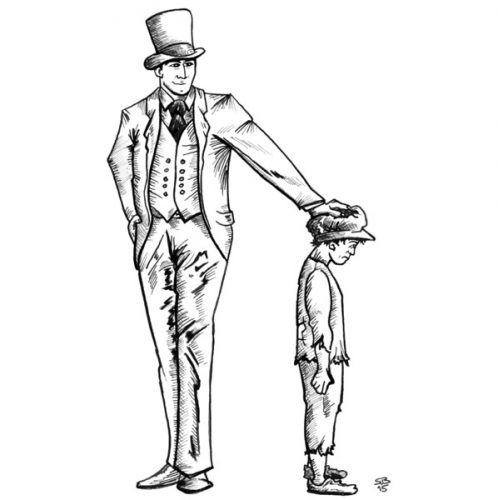By Anthony McCarthy, Community philosopher
John B Rawls (1921- 2002) was a philosophy professor at Harvard and Oxford Universities.
He was awarded a Bronze Star in World War 2, where he fought in the Far East against the Japanese. It was his time in that War, witnessing the slaughter and chaos, that made him a philosopher.
He developed an idea that Justice was essentially an issue of Fairness. In 1971, he wrote his famous work A Theory of Justice. The ideas he outlined are relevant today and could be seen in the positions outlined by the major parties in the recent 2015 General Election, in the UK.
His main point is that we are all free agents; no-body is to be coerced into adopting a point of view. This is the main idea of modern Conservatism: the freedom to develop your own life to the full, without outside interference. Of course, this freedom is really economic freedom: the more money you have, the more choice you have.
Labour and The Liberal Democrats take this idea of freedom a bit further and adopt Rawls’ notion that fairness can only really be a reality if there is some form of re-distribution of wealth; the least privileged in society must be the prime winners from any new political policy. This introduces the idea of welfare and social structures: Rawls advocated the establishment of minimum entitlement: a social minimum, below which no citizen can fall.
Rawls thought that Man is born with a ‘moral capacity’. He thought that Man is more inclined to co-operation than competition. This is a rejection of Thatcher’s ‘no such thing as society’; Rawls thought that people are naturally good and inclined to help each other if they see that they are operating under a ‘fair system’: ‘fair’ means that the deserving get rewards and no-one starts life with an inbuilt, unfair advantage: this was the basis of New Labour, a social democratic party. The Tory idea is that ‘greed is good’ and natural; that people should be allowed to get as rich as they can and then allow their wealth to ‘trickle down’ to the people below them.
Rawls’ most famous thought experiment was ‘the original position’: imagine a group of people on a desert island. They are drawing up their new ‘system’; some will be leaders, others followers: however, they don’t know which role they will each be given, therefore they make sure there is as much opportunity and equality as possible in the new Constitution.
Rawls’ starting point is the question of what principles of justice would individuals agree to when designing a new society, and concludes it would be one based on fairness. So the idea is that people were asked to choose what kind of society they wanted to live in: 1) a society where you were born into different social classes that had different life advantages or disadvantages; with those of one particular class enjoying very good life chances, and those of another having to make do with very poor life chances, with all the varying degrees in between. Or, 2) one where you were born into a society that didn’t have different levels of social privilege or social disadvantage as part of its structure; where your life chances were more or less equal. The choosing here is done without anyone knowing where ‘their’ position in the new society would be; that is: from behind a ‘veil of ignorance’.
So, Rawls faces us with the same challenge as in his day: to design a way of living that makes us all stakeholders in society and makes us feel no-one is born into social privilege or disadvantage due to an accident of birth.
Contact Philosophy in Pubs
Website: www.philosophyinpubs.org.uk
Philosophy in Pubs Enquiry Groups/Venues – Spring 2016
The Crown: Lime Street, City Centre. Meets weekly, Mondays 2.30pm upstairs
Stamps Bar: Moor Lane, Crosby. Meets every Thur at 7pm
The Victoria Hotel: Great George St, Waterloo. Every Tue 6.30pm
Keith’s Wine Bar: Lark Lane, Sefton Park, Liverpool. Every Tuesday 7.30pm
Friday Forum: 7 Abercromby Square, Philosophy Dep’t, Uni of Lpool. Every 2nd and 4th Friday of the month (2pm)
The Halfway House: Woolton Road, Childwall. Every 2nd and 4th Thursday of month (7.15pm)
Lakesideview Kiosk: Newsham Park, Orphan Drive, by model boating lake. Meets 1st Wed of month (1pm)
The Belvedere: off Falkner St, off Hope Street (Cultural Quarter, L’pool City Centre) 2nd Mon of month (7pm)
The Bluecoat: bar/restaurant: School Lane, City Centre. 2nd and 4th Tuesday of the month (1pm)
The Casa Bar (and Social Centre): 29 Hope Street, City Centre, Meets every 2nd Saturday at 11am)
The Perch Rock Hotel: 7 Grosvenor Rd, New Brighton. Meets every 3rd Mon of month (7pm to 9pm)
The Johnny Pye: 5 Pye Road, Moor Lane, off Telegraph Rd, (behind Bus station) Heswall. Meets every 2nd Tuesday (7pm to 9pm)
The Rose & Crown: 57 The Village, Lower Bebington. Meets every 1st and 3rd Wednesday of the month (2pm till 4pm)
The Red Cat: Greasby Road, Greasby. Meets every 3rd Thursday of month (2pm to 4pm)
(Illustration by Sean Biggs – www.seanbiggs.co.uk)
